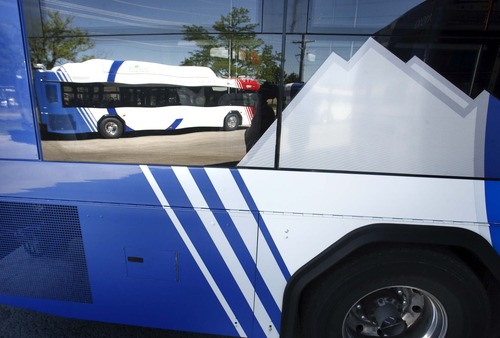This is an archived article that was published on sltrib.com in 2014, and information in the article may be outdated. It is provided only for personal research purposes and may not be reprinted.
In the waning hours of the Legislature, Sen. Jerry Stevenson made a normally routine motion to debate a bill that would allow local elections on raising sales tax for mass transit.
He was surprised to hear an unusual chorus of loud no's in objection to even debating HB388. That was a swift, unexpected death for the bill, visibly stunning Utah Transit Authority officials and lobbyists watching in the gallery.
"When I agreed to take the bill, I was told it had plenty of votes to pass. But only nine [of 29 total senators] even voted to uncircle it" to begin debate, said Stevenson, R-Layton, the Senate sponsor of the bill that had easily passed the House 58-10.
The Senate refusal came despite support from a long parade of chambers of commerce, regional planners, clean-air groups and county and city officials, built carefully over the past year by producing studies on needs, news conferences and publicity.
With such support from movers and shakers, why did it die?
"A lot of senators viewed it as a tax increase," Stevenson said, even though supporters tried hard instead to portray it merely as allowing local elections. "Our caucus had taken an early position that we didn't want to pass out any tax increases this year. It's an election year."
"It wasn't increasing any taxes at all," said Rep. Johnny Anderson, R-Taylorsville, the bill's sponsor. "It would authorize local communities to put it to a vote. We as legislators cap taxes. This would let us get out of the way to let voters decide if this was something they want."
That argument worked in the House — but Stevenson said many senators simply saw it as an election-year tax increase. Also, some interests pushed to give local governments flexibility to perhaps take some of that extra tax revenue for other initiatives to help overall transportation or pollution.
With talk of possible amendments to address that, debate likely would have taken time. And when its turn came, only a couple hours were left before the midnight Thursday deadline to adjourn and many pieces of legislation were backed up awaiting a vote.
So Stevenson and Anderson said senators simply moved on to other issues.
Claire Geddes, a community activist who is a longtime critic of UTA who lobbied daily at the Legislature, said senators also were raising questions about management of the agency — and its high salaries and bonuses — and whether it would spend extra revenue wisely.
Amid such concerns, the bill was to have prohibited UTA from using any of the increase to extend its TRAX or FrontRunner lines, although it could be used to increase frequency of such train service. Anderson said the tax was aimed mostly at increasing bus service that was cut to afford expanding the rail system just as the recession hit.
The bill was to have allowed elections on raising the sales tax for transit by a quarter-cent for every $1 purchase to generate as much as $91.5 million more annually by 2016.UTA estimates that the tax hike could have increased overall transit service by 68 percent over five years, and increased ridership by 89 percent.
Anderson said he may attempt the bill again next year, or seek another method to fund mass-transit needs. He is House chairman of the Transportation Interim Committee, and said it hopes to come up with solid suggestions on how to cover a projected $11 billion shortfall through 2040 for high-priority transportation projects statewide.
UTA General Manager Michael Allegra said Friday that UTA now plans to "continue to do the best we can" with current funding. He said it has plenty of money to operate its current trains and buses, but had hoped to increase service with additional money.
Local governments have made expanding service a priority, he said, so UTA wants to accommodate those priorities.
The UTA board has adopted goals for 2014 that include requiring executives to "develop a plan to educate and inform" the public and partners "on full funding and implementation of the Unified Transportation Plan."
UTA officials have testified that funding transit projects in that plan eventually would require an increase in sales tax to around 1-cent per dollar purchase for transit.



